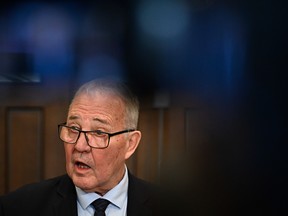Conservatives argue the update fails to take global realities into account and shows a lack of urgency by the Liberal government
Article content
OTTAWA – Defence Minister Bill Blair said his government’s plans for Canada’s military are meant to be concrete, funded plans, not merely aspirational, as opposition parties accused him of moving too slowly to rebuild the Armed Forces.
Blair appeared Monday at the House of Commons national defence committee to take questions about the new defence policy the Liberals unveiled last week after nearly two years of work.
Advertisement 2
Article content
Article content
The review adds $8.1 billion in defence spending over the next five years, with larger amounts promised over the next 20 years. It projects bringing Canada’s defence spending to 1.76 per cent of GDP by 2029, still below the NATO target that the Trudeau government has committed to meet.
Conservative MP James Bezan told Blair he thought the entire update failed to take global realities into account.
“I’m disappointed in the defence policy update. There’s no sense of urgency here. We’ve got war waging in Ukraine, we just witnessed Iran attack Israel … we have seen war throughout the Middle East and in the Red Sea. And we are witnessing a powder keg that’s about to explode in the South China Sea,” he said.
Blair said his defence update was a realistic assessment of what Canada could do and is not simply numbers on paper.
“In Canada, we do not publish our aspirations. We publish our funded plans and this document talks about the money that we’ll be committing in this upcoming budget in order to bring that forward,” he said.
Blair also pointed out that defence spending had fallen under the Conservatives, dropping below one per cent of GDP in 2014, the last year of former prime minister Stephen Harper’s time in office.
Article content
Advertisement 3
Article content
Bezan defended that record and said Canadian troops were much better off when his party was in power.
“I’m very proud of our record supporting our troops. We never had troops lined up at food banks. We never had troops living rough. We never had our international allies say they can’t depend on Canada,” he said. “That’s all on this Liberal government that is not on the previous government.”
Recommended from Editorial
One of the many items in the new budget is a commitment to produce more artillery shells, desperately needed in Ukraine, as well as to restock Canada’s supplies. The government has given $40 million to the Czech government as part of a broader international effort to make munitions for Ukraine.
But it has also promised to ramp up domestic production.
Conservative MP Pat Kelly said Blair had previously promised that would begin within a year, something that hasn’t taken place.
“You said that that would take place this year. When will the new shells be rolling off Canadian production lines?”
Advertisement 4
Article content
Blair didn’t answer that question directly, but said with the limited capacity in Canada today industry needed a long-term commitment to restart production lines, something they are now confident will take place.
“We’re working with industry to make the necessary investments that industry said they required and we now have the money to negotiate the long term contracts,” he said.
The government’s plan is to have production of the standard NATO round take place at a facility in Canada. That type of ammunition is not currently made here. Deputy minister Bill Matthews told committee members that made the entire process more difficult.
“What we actually want is a new production line started, and that will take time,” he said.
MPs also asked about the commitment in the new defence policy to explore a new submarine fleet. The government made no specific promises and no financial commitment, but said it would explore acquiring a new submarine fleet that could operate under ice.
While the defence policy update only talked about a conventional fleet, Prime Minister Justin Trudeau didn’t rule out a nuclear-powered fleet in later comments. Matthews said the government is just in the early stages of that process.
Advertisement 5
Article content
“The options analysis has started. We have had a team meeting with various manufacturers of traditional conventional submarines,” he said. “We will be looking at options to bring to the government for decision and they will include conventional versus nuclear but also how many submarines.”
National Post
rtumilty@postmedia.com
Get more deep-dive National Post political coverage and analysis in your inbox with the Political Hack newsletter, where Ottawa bureau chief Stuart Thomson and political analyst Tasha Kheiriddin get at what’s really going on behind the scenes on Parliament Hill every Wednesday and Friday, exclusively for subscribers. Sign up here.
Our website is the place for the latest breaking news, exclusive scoops, longreads and provocative commentary. Please bookmark nationalpost.com and sign up for our politics newsletter, First Reading, here.
Article content




_(1).jpg?fit=around%7C1080:1080&output-quality=90&crop=1080:1080;center,top)



